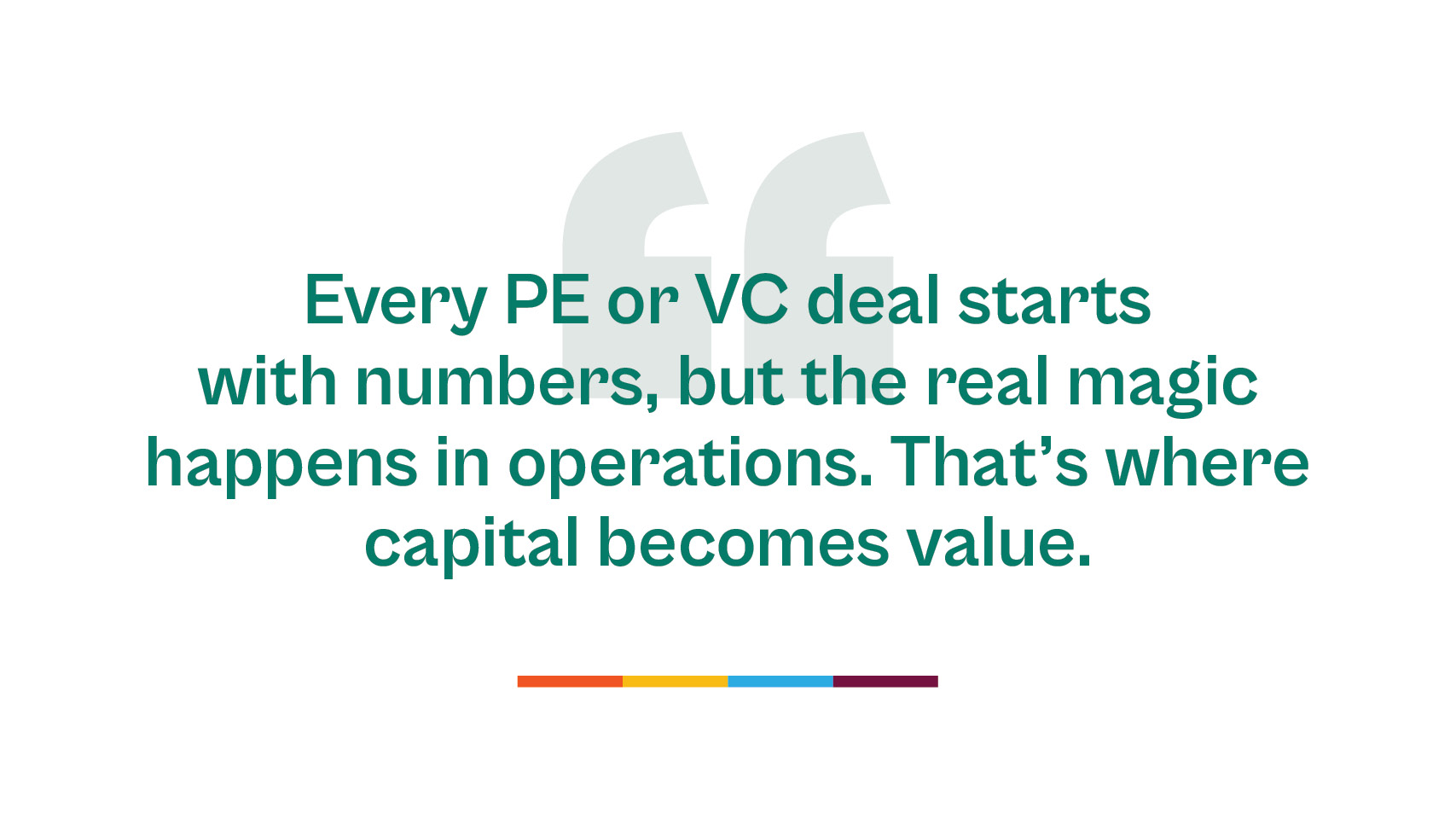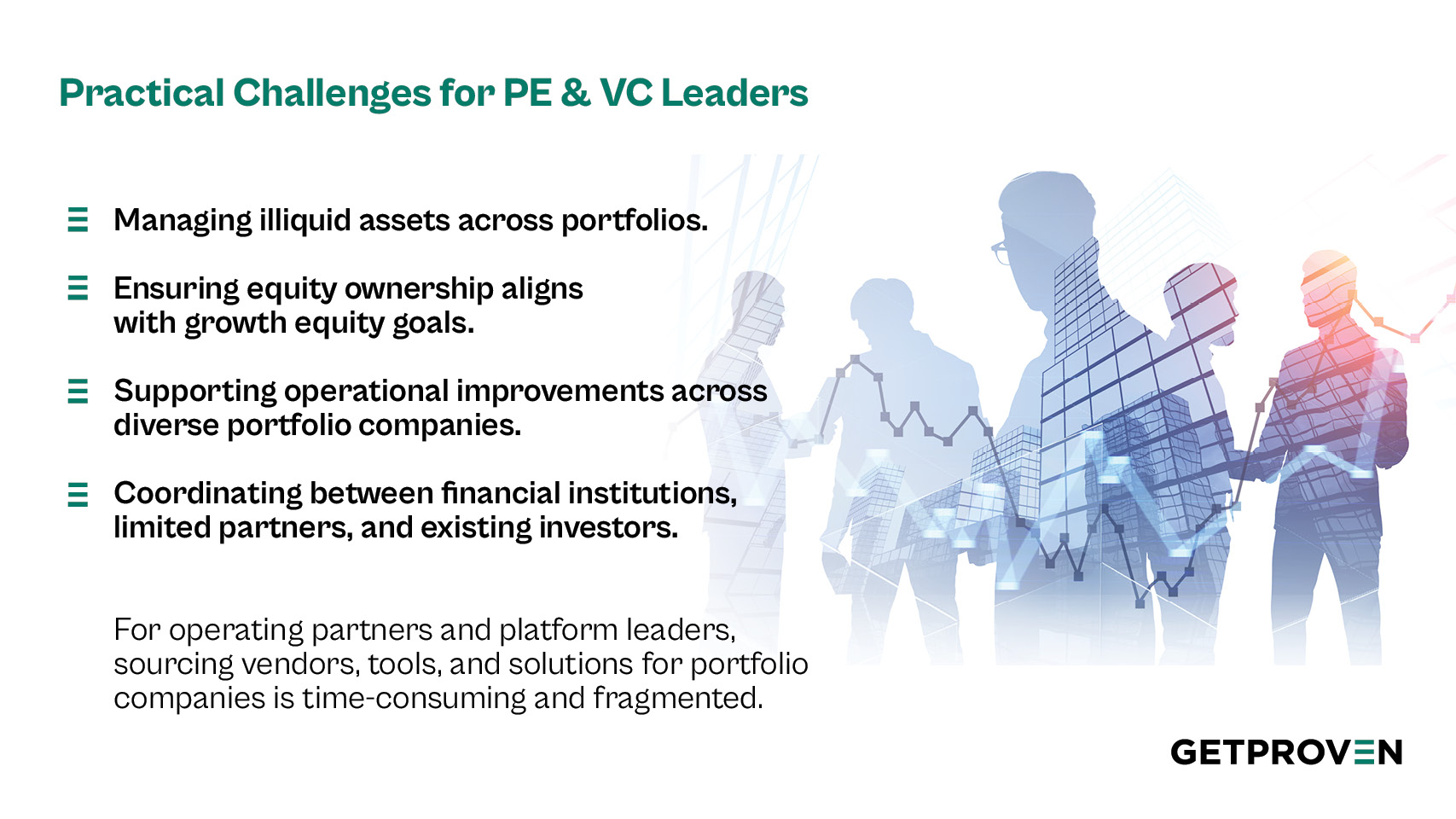
Private Equity vs Venture Capital: How Value Gets Created

If you’ve recently stepped into a platform or operations role inside a private equity or venture capital firm, you already know the expectations and might even be feeling the pressure of delivering measurable value across every portfolio company fast.
The challenge is that the finance ecosystem you’ve entered is vast, complex, and filled with jargon about leveraged buyouts, venture funding rounds, and growth equity strategies.
For platform leaders, the question isn’t just what private equity and venture capital are but rather it’s how these models actually create value and where your firm can move the needle through better systems, smarter investments, and scalable operations.
This guide breaks down the moving parts of the PE and VC landscape in plain language. You’ll learn how private equity firms and venture capital firms differ, how they support companies at various stages, and how emerging platform leaders can navigate the ecosystem more confidently while uncovering practical resources that make portfolio support streamlined and more effective.
TL;DR
- Private equity firms focus on established companies, using private equity strategies such as leveraged buyouts and operational improvements to unlock growth.
- Venture capital firms invest in early stage companies and emerging companies with high growth potential, fueling innovation in startup ecosystems.
- Both industries rely on institutional investors, pension funds, sovereign wealth funds, and high-net-worth individuals to raise capital.
- PE and VC represent distinct parts of the private capital asset class but share a common goal: helping portfolio companies grow and deliver strong returns.
- For PE/VC leaders, efficient operations are critical. A new Proven Marketplace offers curated tools and discounts for portfolio companies to help streamline portfolio support.

The Role of Private Equity in Value Creation
Private equity is often seen as a world of numbers and deals, yet at its core, it’s about transformation. A private equity investor doesn’t just buy a company; they buy into the belief that it can be better.
Most private equity investment strategies target more mature companies that have strong fundamentals but need operational improvements to unlock growth.
The process typically begins with a leveraged buyout, using debt financing such as bank loans to gain an equity ownership position and control over a company’s cash flow. From there, the real work starts.
A successful private equity playbook often includes:
- Restructuring operations and streamlining costs to strengthen cash flow.
- Upgrading leadership teams and aligning ownership stakes with company’s equity.
- Investing in growth equity initiatives that open new markets or modernize legacy models.
- Preparing the business for exit, whether that’s an initial public offering (IPO) or strategic sale.
Behind every deal sits a complex ecosystem of private equity funds, limited partners, and institutional investors (from pension funds and sovereign wealth funds to investment management companies), all seeking returns from illiquid assets that traditional public markets can’t offer. In exchange, private equity firms earn management fees and carried interest for steering these transformations to success.
Harvard Business School and major investment banks have studied this model for decades, but its essence is simple: private equity firms buy time, talent, and control, then use them to create measurable value.
For platform and operations leaders, understanding this engine of value creation isn’t academic; it’s essential. The better you grasp how PE firms turn struggling private companies into high-value, growth-ready organizations, the more effectively you can support them.
We explore actionable ways PE firms can optimize operations and deliver sustainable portfolio impact here.
How Private Equity Firms Support Companies
Once a deal closes, the hard part begins. Private equity firms don’t simply acquire businesses they inherit every inefficiency, outdated process, and leadership gap that held those companies back in the first place.
The real value creation happens after the investment, when operating partners and platform teams step in to stabilize and rebuild.
In today’s market, where interest rates and competition both run high, private equity firms are under pressure to show measurable operational improvements across their portfolio companies. That means working with management teams to cut or optimize costs, build sustainable systems that increase the company’s cash flow, improve transparency, and create long-term equity value.
Typical support strategies include:
- Building financial and operational discipline — establishing reliable reporting and performance tracking.
- Strengthening leadership teams — aligning incentives and equity ownership with business outcomes.
- Driving digital transformation — modernizing infrastructure, processes, and vendor management.
- Executing growth equity initiatives — identifying new markets or product lines to fuel expansion.
Private equity firms rely on a deep network of investment firms, financial institutions, and trusted advisors to deliver these changes. Their goal isn’t just to prepare a company for an initial public offering (IPO); it’s to ensure that when the company reenters the public markets or is sold to a strategic buyer, it’s stronger, more competitive, and more profitable.
For platform professionals working in PE, this stage is where your impact is most visible. Whether you’re introducing a shared service, standardizing procurement, or guiding portfolio executives through change management, you’re translating private equity investment strategies into real-world outcomes. The contribution you bring could go a long way in enabling the firm to deliver on its promise to LPs.
Explore more about value creation in private equity and how the right team can support portfolio companies here.

Why Startups Seek Venture Capital
If private equity is about transformation, venture capital is about acceleration. Venture capital firms invest in possibility, in early-stage companies that are still defining their markets, proving their models, and building their teams.
For many founders, venture funding is the difference between a good idea and a company that changes an industry.
Startups seek venture capital for three main reasons:
- Access to capital — They need resources that bank loans or mutual funds won’t provide, especially before their cash flow stabilizes.
- Strategic support — VCs bring networks, operational guidance, and credibility.
- Speed — VC funding allows founders to move faster than competitors, expanding markets or scaling products before larger incumbents react.
But not all venture funding looks the same. The venture capital ecosystem spans from mega funds to specialized niche players:
Andreessen Horowitz (a16z) has backed some of the world’s most transformative startups (Airbnb, Coinbase, Stripe) using a model that combines capital with deep operational and technical expertise.
Sequoia Capital and Benchmark continue to define the playbook for early-stage investing, emphasizing long-term partnerships and active mentorship.
Bessemer Venture Partners and Index Ventures have built diverse portfolios that include SaaS, biotech, and consumer companies across continents.
On the other end of the spectrum, smaller funds like Backstage Capital (focusing on underrepresented founders) or Soma Capital (early bets on emerging founders) demonstrate how the venture capital industry continually evolves to fill new gaps in the innovation economy.
Each of these venture firms operates within the same core logic: deploy private capital from limited partners (institutional investors, sovereign wealth funds, pension funds, and high net worth individuals) into emerging companies with outsized growth potential. In return, they earn equity stakes and, eventually, significant funding outcomes through IPOs or acquisitions.
Venture capitalists don’t just write checks; they help shape company-building from the inside out. They connect founders with other investors, help hire critical talent, and push for strategic pivots when market conditions shift.
For operations professionals coming from private equity or corporate backgrounds, it’s a faster, riskier environment with a steep learning curve but extremely rewarding.
And while venture capital work often conjures images of Silicon Valley, the model has expanded globally.
In Europe, funds like Atomico and Northzone are backing growth equity rounds in tech and climate innovation.
In emerging markets, TLcom Capital and Partech Africa are proving that venture-backed companies can thrive in vastly different ecosystems.
Understanding how these venture firms operate helps platform leaders identify patterns that transcend asset classes, spotting where operational excellence, governance, and data discipline can make even high-risk, high-reward investments more sustainable.
What Does the Venture Capital and Private Equity Ecosystem Really Look Like?
Behind every venture-backed success story and every private equity turnaround lies a complex web of capital, expertise, and relationships, which we often call the finance ecosystem.
For new platform leaders and operations professionals, understanding this ecosystem isn’t just about tracing money flows; it’s about recognizing the interdependence between investors, founders, and the institutions that keep innovation and growth moving.
At the highest level, private equity and venture capital both belong to the broader private capital asset class, yet they operate very differently.
Venture capital firms:
They raise funds from limited partners, including institutional investors, pension funds, sovereign wealth funds, and high-net-worth individuals, to back early-stage or emerging companies with strong growth potential.
Private equity firms:
By contrast, PE firms focus on more mature companies or established businesses that can benefit from restructuring, debt financing, and operational improvements.
Each of these investment firms serves a distinct purpose in the economy. VC firms inject risk capital to help startup companies grow quickly, while PE firms provide strategic capital and guidance to stabilize or scale target companies for the long haul.
The venture capital industry itself operates through a network of actors:
- General Partners (GPs): The venture capitalists managing the fund and selecting investments.
- Limited Partners (LPs): The institutional investors, family offices, and mutual funds that provide capital.
- Portfolio Companies: The startups receiving funding and operational support.
Funds like Sequoia, Andreessen Horowitz, and Accel often manage multiple fund vintages simultaneously — early-stage, growth equity, and even later-stage crossover funds that blur the lines between venture capital and private equity investments. Meanwhile, newer venture firms like Notation Capital or First Round Capital specialize in seed-stage funding, acting as early validators for the next generation of founders.
Supporting this entire ecosystem are investment banks, financial institutions, and investment management companies that provide deal flow, due diligence, and eventual exit opportunities through IPOs or acquisitions in public markets. Hedge funds and sovereign wealth funds, once considered outsiders to venture investing, now participate directly or invest indirectly via larger venture funds.
The result is a fluid ecosystem where money, mentorship, and management expertise circulate between venture firms, private equity funds, and institutional investors, each playing a role in turning ideas and struggling companies alike into long-term value creation stories.
For platform and operations leaders, understanding these connections is crucial. It helps clarify where you fit: not just as an observer, but as an architect of systems that make this ecosystem run more efficiently, from the way portfolio data is managed to how shared vendors are sourced across multiple companies.

The Real-World Challenges Platform Leaders Face in PE & VC
Ask any platform leader or operating partner what keeps them up at night, and the answer rarely involves deal sourcing or valuation models. It’s the execution that’s hard, the messy middle between investment and exit.
In theory, both private equity and venture capital firms are built to create value. In practice, that value is unlocked (or lost) in the operations: aligning goals across portfolio companies, implementing the right tools, and building repeatable systems that scale without slowing teams down.
For private equity firms, the challenge is standardization at scale. After a leveraged buyout or growth equity investment, each company comes with its own data systems, vendor relationships, and reporting quirks. Platform leaders are expected to create common processes for finance, HR, IT, and procurement, all while keeping company leadership engaged and aligned.
For venture capital firms, the difficulty is the opposite: too much variety. Portfolio companies are young, fast-moving, and resource-constrained. The VC operating partner’s role is often to provide light-touch guidance connecting founders to talent, tools, and networks without stifling their autonomy. Striking that balance between empowerment and oversight takes nuance.
Add in the broader realities of today’s market (higher interest rates, tighter capital, and greater scrutiny from limited partners), and the pressure intensifies. Platform leaders must show that their operational playbooks directly contribute to returns. They have to think like investors but act like operators.
It’s no surprise, then, that many firms are rethinking their approach to portfolio enablement. Instead of manually sourcing vendors or relying on informal networks, leading funds are starting to centralize the tools, data, and services their companies need. This shift isn’t about technology for its own sake; it’s about time, consistency, and risk reduction.
For emerging operations professionals, this is the new frontier: learning to operationalize collaboration across diverse portfolio companies and investment stages without losing focus on what matters most: growth, efficiency, and measurable outcomes.
To make this work easier, we’ve built a practical resource: the Proven Marketplace. It curates the best tools and vendors for portfolio companies, complete with exclusive discounts and recommendations so platform teams can focus less on procurement and more on value creation.
.jpg)
FAQ
Q: What are private equity investment strategies?
Private equity strategies include leveraged buyouts, growth equity, and operational improvements designed to improve company’s cash flow and long-term performance.
Q: How does venture capital work for early-stage companies?
Venture capital firms raise funds from limited partners, then invest indirectly into startup companies by taking equity stakes in exchange for significant funding.
Q: Why do startups seek venture funding instead of bank loans?
Unlike bank loans, venture funding and vc funding do not require immediate repayment and provide access to networks, mentorship, and growth capital.
Q: What role do institutional investors and pension funds play in private equity funds?
Institutional investors, pension funds, and sovereign wealth funds are limited partners that commit private capital to private equity funds as part of their diversified asset class allocations.
Q: What are management fees and carried interest in private equity funds?
Management fees cover operational costs of private equity firms, while carried interest represents the share of profits that general partners earn from successful private equity investments.
Q: How do vc firms raise money from existing investors and limited partners?
VC firms raise capital by securing commitments from institutional investors, high net worth individuals, and existing investors, who invest indirectly in venture capital funds.
Q: Why are private equity investments considered illiquid assets?
Private equity investments involve ownership stakes in private companies, which cannot be sold easily in public markets, making them illiquid assets.
Conclusion
The headlines in private equity and venture capital usually go to the billion-dollar exits, the unicorn valuations, and the mega-fund announcements. But inside the walls of every fund, the real story is about the operators, platform leaders, and advisors who turn abstract investment theses into real, working businesses.
Their work doesn’t happen in boardrooms or on deal memos. It happens in spreadsheets, strategy sessions, workflows, platform development, and vendor evaluations. It’s in the daily decisions that transform cash flow problems into growth stories, and promising startups into enduring companies.
That’s what value creation actually looks like: not a single playbook, but hundreds of small, smart choices made by people who understand how to balance ambition with discipline.
For anyone stepping into this world, whether you’re joining an operating team at a private equity firm or building your first platform function at a venture fund, the goal isn’t to chase trends. It’s to design systems that help others succeed faster and with more focus.
The PE and VC ecosystem will keep evolving, shaped by new capital, new technologies, and new pressures from limited partners. But one truth won’t change: the firms that win are the ones that learn how to operationalize their insight and build reliable engines for growth across their portfolios.
If you’re exploring ways to strengthen that engine, let our vendor solution streamline vendor management for you and your portcos. Try Proven for free.







.png)





